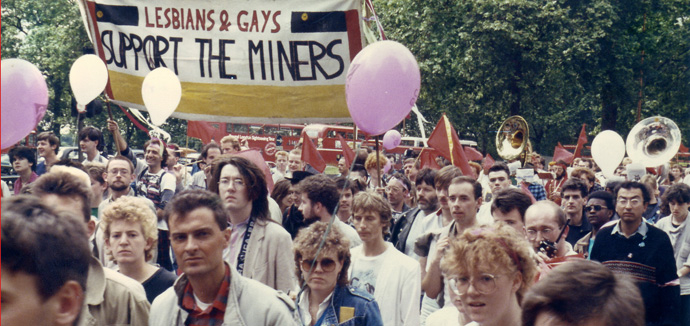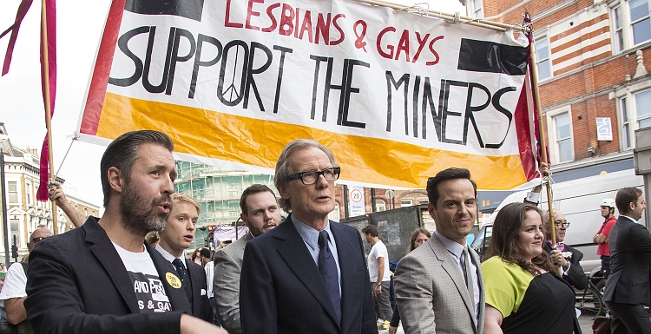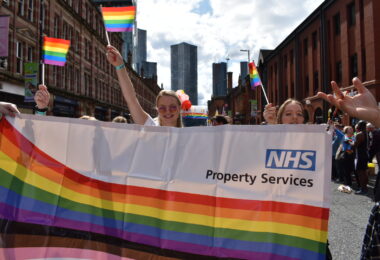Pride handles a tricky subject with light humour and a clever storyline, not to mention brilliant acting.
If you’ve seen the trailer for Pride, your reaction and expectations may have run parallel to mine: another feel-good movie about a minority group tackling the odds to come out victorious in the end, wholly predictable, easy, tear-inducing production. Whilst the premise of two unlikely groups of people coming together to fight for a cause is nothing new, what drew me to this film were the two groups specifically: a small town of Welsh miners and a band of proud gay Londoners.
An unlikely alliance
Based on a true story and set during the 1984 miners’ strike, Pride starts with Joe (George McKay), a young closeted man in college, still living with his parents, who, while at a gay pride rally and through a series of unforeseen circumstances, ends up being part of a new group with the abbreviation LGSM. LGSM, which stands for Lesbians and Gays Support the Miners, is spearheaded by Ben (Mark Ashton), a young gay rights activist, who realises that miners are being treated with the same disregard by the police and government as the gay community.
Due to the miners’ ostentatiously working class roots and negative perception of the gay community, they are small in number, and as a result, end up with a merry band of other individuals from the gay rights movement, including Jonathan Blake (Dominic West), one of the first people in the United Kingdom to be found positive with HIV and his boyfriend, Gethin (Andrew Scott). They receive little to no support until they contact the Welsh town of Onllwyn, where they are greeted heartily by some of the people on the town’s council, Cliff (Bill Nighy), Hefina (Imelda Staunton) and Dai (Paddy Considine), but perhaps less enthusiastically by the rest.
Gays, miners and art
Despite its initial light-hearted feel, a tone that persists through to the end of the film, Pride has a certain charm and tackles its various issues with an artistic grace. It doesn’t have the gritty texture we were subjected to with the likes of the Sean Penn biopic, Milk, but is rather peppered with an almost wholesome British humour which, if not taken with a grain of salt, might prove tiresome and present a case of “seen it, heard that”. This trait of the film marks it as being neither laugh-out-loud funny nor completely void of a well-deserved chuckle, but rather somewhere in between.
There’s also a lot of poking fun at the less enlightened (not the hardcore bigots; they are saved for the dramatic tension that grounds the film), with in-your-face attempts at pushing a message of ‘how silly it is to treat them differently for being different!” As Imelda Staunton’s Hefina remarks to a passer-by while driving an ostentatiously “gay” van and being asked if she is a lesbian: “We’re just off to Swansea for a massive lez-off!”

However, don’t let that take away from the gravitas this film has to offer. Bill NIghy’s portrayal of Cliff as a quiet and subdued poetry-quoting member of the council is done with such subtle aplomb that one cannot help but greedily demand more of his screen time. The rest of the cast are no one-trick ponies either, with on-screen talent in full 1980’s swing.
Dominic West as the utterly flamboyant and self-destructive Jonathan Blake is a guilty pleasure, Paddy Considine’s naïve representation of gravelly miner juxtaposes beautifully against the more outspoken “lesbians and gays” and Imelda Staunton’s authority over her character is unsurpassable. However, it’s Gethin, the character played by Sherlock’s Andrew Scott, who becomes a personal favourite, playing a Welshman with hidden issues and a buried past.
The movie tries to embrace a wide audience with its brand of “open” humour, a familiar concoction of “Ohhh, don’t you just love the (enter chosen brand of minority)”. Pride is an extremely well-told film and if it is given more than just a quick glance, you could soon find brilliantly constructed characters and a wealth of emotion.








